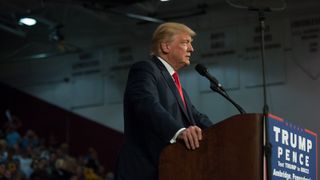The economic damage wrought by increased taxes on international trade is well-known, as is the politics driving such self-destructive policies. Yet the direct costs of these measures are only the start. Just as damaging is the economic policy uncertainty engendered by an open-ended trade war.
While there is always some uncertainty surrounding the policy decisions of governments, the Trump administration has taken such uncertainty to unprecedented levels. Thanks to the Economic Policy Uncertainty Index developed by Scott Baker, Nicholas Bloom and Steven Davis, we can now better quantify policy uncertainty and its economic effects on the United States, Australia and the rest of the world.
In January 2017, as the newly-elected President Trump pulled the United States out of the Trans-Pacific Partnership, the Global Economic Policy Uncertainty Index was higher than during the Asian crisis, the September 11 2001 terrorist attacks, the 2008-09 global financial crisis and the 2011 European debt crisis.
Investment spending is particularly vulnerable because uncertainty increases the option value of delaying investment decisions.
In an environment of increased uncertainty, business, investors and consumers become more cautious. Investment spending is particularly vulnerable because uncertainty increases the option value of delaying investment decisions. Investment spending is also a major driver of international trade, which is dominated by trade in intermediate and capital goods.
In my report, State of Confusion, I quantify the effects of global economic policy uncertainty on global industrial production and international trade volumes. A one standard deviation increase in economic policy uncertainty leads to a 0.5 per cent decline in global industrial output and a 0.8 per cent decline in international trade after six months.
While there are other factors at work, not least the substance of the economic and trade policies actually adopted by governments, uncertainty is itself costly and has powerful cyclical effects. It should be noted that policy uncertainty is distinct from general economic uncertainty. There will always be an unpredictable or random component to the economy reflecting factors over which policymakers have little control. Although policy uncertainty is often correlated with general economic uncertainty, they are not the same thing.
Until the beginning of this year, the volatility of US equity and other financial markets had fallen to record lows, reflecting reduced volatility in underlying economic fundamentals such as economic growth and inflation. Yet economic policy uncertainty remained elevated, pointing to the potential for such uncertainty to destabilise the global economy and markets.
The good news is that the Australian economy appears to be relatively resilient to economic policy uncertainty shocks, whether at home or abroad.
The good news is that the Australian economy appears to be relatively resilient to economic policy uncertainty shocks, whether at home or abroad. My research shows that such uncertainty is mainly borne by declines in the Australian dollar real effective exchange rate, real interest rates and foreign portfolio investment flows. Australia’s floating exchange rate and other financial markets adjust to insulate us from some of the consequences of policy uncertainty.
Australia’s international trade, foreign direct investment and gross national expenditure do not show statistically significant responses to economic policy uncertainty shocks, which is not to say these variables cannot be harmed by the substance of economic policy.
However, we should not be complacent. Other researchers have found that policy uncertainty weighs more heavily on economic activity during an economic downturn. Because there has not been a conventionally-defined recession in the sample period covered by the Australian Economic Policy Uncertainty Index, we cannot be confident that the local economy will be as resilient in a future downturn.
We cannot be confident that the local economy will be as resilient in a future downturn.
Just as there are costs associated with increased policy uncertainty, there are economic benefits from reducing uncertainty. These benefits can be captured by adhering to well-defined, transparent and rules-based policy frameworks. Bipartisan support for these frameworks can reduce the uncertainty that would otherwise arise from elections and changes in government. Bilateral, plurilateral and multilateral trade agreements can also reduce uncertainty about trade policy.






